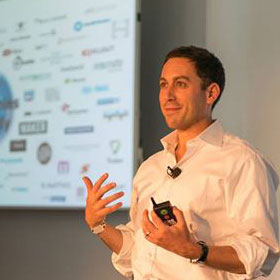Back in college I interned at DLJ, an investment bank enshrined in the book Monkey Business. If you haven’t read Monkey Business it was one of the great exposes about life on Wall Street, including all-nighters, binge drinking, and every other good/bad thing that can be idealized.
At DLJ I was a summer analyst, the low man on the totem pole. I wasn’t qualified to do much, and my boss (herself a “full time” analyst) reminded me of that on a daily basis. For the first time in my young adult life I had no control over my own schedule. Time outside the office was spent in constant anxiety about being called back in, and on more than one occasion I left work just to come back an hour later because everyone I knew was still at their desk. In exchange for that stress I learned a lot about finance, accounting, and PowerPoint. And I got free dinner from every restaurant within a 20 block radius of 277 Park Ave.
That summer I posed a thought experiment to my new friends, “How much would it cost for someone to buy one year of your life?” To use a Star Wars analogy, during that period you would be “frozen in carbonite” – you wouldn’t meet anyone, you wouldn’t learn anything, but you would age and make money. To us, investment banking was carbonite.
I remember the numbers my friends threw out – a million bucks for a year, maybe two million. We didn’t consider taxes.
How naive I was at 21! Nobody on their death bed wishes for more money and less time, and that reality struck me when I was diagnosed with cancer at age 29. I made a full recovery, but I still keep all the hospital bands in a bedside drawer as a reminder. I also didn’t know that I would someday have a daughter whose face would radiate pure joy the minute I walk in the door, making me constantly wish for more time. I also didn’t know how valuable my skills would be, since my resume at that point consisted of landscaping and selling cotton candy at Jacob’s Field.
In hindsight, I would have sold my life much too cheaply. As would all of my friends.
This is not just about 21 year old interns though. Many professionals compartmentalize their lives – they work for money and find little joy in it. Life shouldn’t be that way.
You may not know that VCs also play the role of psychologist and career counselor. Hundreds of people reach out to me every year looking for advice: some are starting a company, others want a career change, and others want a first job (if you happen to want a job we surface opportunities on our website here). Outside of that, I generally give the following advice:
1.) There are only four things that a job can offer: compensation, prestige, education, and network. Many high achievers pursue compensation and prestige and then are surprised to find themselves unhappy.
2.) If you are just starting your career, look for mentorship and a chance to learn new skills. Whether or not you realize it, this is investing in yourself. A good boss should know that you want her job – it is her role to borrow you for a few years, teach you everything she knows, and then send you back on your way. When you interview, look for that person.
3.) If you are an experienced executive considering a start-up, treat your decision like an investment. Understand the company’s valuation, because you will be compensated based on how much it increases. Make sure you believe in management. If a CEO tells you it will be two years until exit, assume six. Look at the company’s growth and figure out if it is sustainable. Most importantly, base your decision on the employees and not the investors. You will be working with the employees every day and may never see the investors again.
4.) Lastly, if you are looking to start a company, meet with as many people as you can to pollinate the idea. There are at least four or five people with the exact same idea as you right now – simultaneous invention works that way – and early execution is about gathering the largest following. If you can’t recruit good people then team up with someone who can. Repeat entrepreneurs are successful because they already have a team.

Ian Sigalow
http://sigalow.comIan is a co-founder and partner at Greycroft Partners in New York City. He has been a venture capitalist since 2001.